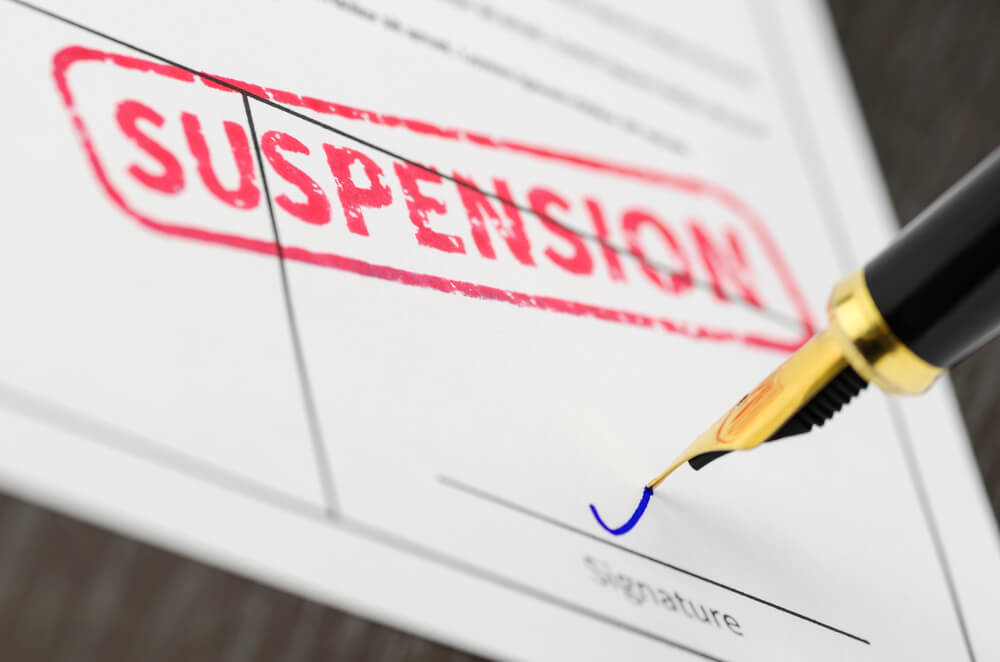Have you recently been suspended from your job pending further investigation from a company that you’ve worked for a long time? Maybe you love your job and want to get back in the office as soon as possible. But you have to wait for a certain period of time until the investigation ends. If the investigation is not work-related but an alleged criminal offence that you didn’t commit, chances are you’ll be cleared and reinstated into your job. However, this process could take months. So, what do you do meanwhile? Can you apply for another job while on suspension?
Table of Contents
What is suspension?

Employee suspension denotes the situation through which an employee is removed from their place of work, temporarily awaiting an investigation into reported misconduct. Some rules of conduct provide for suspension with pay and benefits, while some don’t.
The latter is a bit harsher, though. Suspending employees until an investigation into serious misconduct and the procedures of formal disciplinary measures are common practices in the UK.
The employer generally initiates suspensions to facilitate investigations into alleged misconduct. It reflects the seriousness of allegations while the employee is away from the workplace. And in most cases, a suspension is a neutral act, and you’ve to be available to return to work at instant notice.
Types of suspension
Your employer can ask you to not attend your place of work, engage in any work at all (such as working from home) as part of your suspension. However, you’ll still remain employed.
According to the UNISON, there are two main types of suspension.
- Suspension for medical or health and safety reasons.
- Suspension as part of a disciplinary procedure
Suspension for disciplinary reason can be of two types
- Precautionary suspension.
- Punitive suspension.
Suspension for medical or health and safety reasons
Employers are legally bound to take necessary measures to ensure your health and safety. This implies they can suspend you from work if they deem you may be at particular risk. For example, your employer might suspend you if:
- Workplace conditions become hazardous to health and safety.
- You’re a newly expectant mother.
Whatever the case, your employer must conduct a proper risk assessment before making any decisions. In these situations, your employers can offer you a substitute job that mitigates the risk, even if it’s not mentioned in your contract. Moreover, if you’ve been in your job for at least one month, your employer can suspend you with full pay for up to 26 weeks.
If you’re pregnant and your employer can’t provide you with a reasonable and safe alternative to your job, you’ll be on suspension with full pay for the duration of your pregnancy.
Suspension as part of a disciplinary procedure
Employers can take disciplinary actions in response to problems with employee performance or behaviour. The purpose of disciplinary action is to correct behaviour and document issues.
Precautionary suspension
Precautionary suspension is also known as preventative suspension. If an employer doubts an employee of performing an act of misconduct, it is probable that the employer will want to put that employee on a precautionary suspension. An employer may impose a precautionary suspension if he anticipates that the employee:
- Might have committed an act of misconduct.
- Has disobeyed a term or condition of his or her employment agreement.
- Has done something which may result in disciplinary action.
- The Employer may suspend the Employee on a precautionary basis with full pay and benefits pending an internal investigation by the Employer.
To clarify, a precautionary suspension doesn’t mean the employee is being disciplined. The employee is simply excluded from the workplace as a precautionary step to avoid any interferences in disciplinary inquiries. As a result, the employee by law must receive his or her full pay while being on suspension.
Punitive suspension
On the other hand, a punitive suspension means just that the suspension is severe. It’s a penalty and a punishment placed on the Employee who has violated a term of condition of their employment after a disciplinary hearing. If an employee is on punitive suspension, it would mean that the internal investigation surrounding the misconduct is complete. Following the investigation:
- The employer must hold a disciplinary hearing.
- The employee must have the privilege to defend the charges levelled against him or her.
- If the employee is found guilty, then the punitive suspension is a sanction that may apply to the employee as an alternative to dismissal.
Can you apply for another job while on suspension?
The answer is YES! You can apply for another job while on suspension. But there’s a risk that you might lose your current job or breach the conditions of employment. So, read ahead to learn everything you need to know about suspension before applying for another job.
What do you need to know before applying for another job while on suspension?

If you’re on suspension, you should know about the circumstances of their suspension before applying for another job. You need to find out whether the suspension is with or without pay. Most importantly, you need to ask your employer how long the suspension will be.
However, if you’re on suspension without pay for an extended period of time, there’s a high probability that it’ll end up in the termination of your employment. So, you don’t need to wait for months or years to start applying for another job. However, if it’s a suspension with pay, that’s not a termination. So, you should:
- Ask your employer what you are expected to do during the suspension.
- Check-in with a supervisor or HR if required.
- Go after the rules and guidelines stated in the letter of suspension.
- Find out whether others did the same thing.
If you are on paid suspension, you have a legal obligation to be available for employment by your employer. Most importantly, you shouldn’t take up employment while on suspension as that has the effect of terminating your previous employment.
On the contrary, if you are not being paid while on suspension, and you think it might lead to dismissal or termination of your job, you should look for alternative employment almost immediately upon dismissal in order to mitigate the damages.
What happens after suspension from employment?
You remain an employee even after suspension. Therefore, you should maintain your employment rights while you are on suspension. As a provision of your suspension, your employer may forbid you to speak to your colleagues and clients of the business. It’s lawful unless you can show that it interferes with your ability to answer any accusations that have been made against you. So, consider carefully whether it’s in your best interest to stay where you are in the meantime.
Things you should consider before applying for another job while on suspension
If you were suspended due to an act of misconduct, it’s possible that you were investigated but weren’t dismissed by your employer. And if you’re thinking of resigning from your current job to move on elsewhere and start afresh, which might seem like an attractive prospect, you should consider the following facts.

- Remaining in your current job will mean you can fix shortcomings, go through more training, take advantage of any continuing assistance, coaching or supervision and create a timeframe for the incident.
- Applying for another job might affect your current employment contract as you’re still employed.
- Resigning from your current job in the middle of an ongoing investigation will not counteract or stop the investigation process.
- You’ll still need to disclose the details of any incident to a prospective employer when you go for a new job.
Applying for a new job in these circumstances can be quite difficult because most employers will want to know the outcome of your case before deciding whether to employ you. So, if you choose to leave your employer and apply for another job, try not to quit without having another job lined up.
How to apply for another job following disciplinary suspension?

Taking into account that you want to apply for another job while on suspension, which might terminate your current employment, you need to disclose the incident for which you were suspended. Moreover, some application form will ask you directly if you have been suspended, investigated, sanctioned or dismissed. If you don’t unfold something when you’ve been directly asked to do so, it can lead to the withdrawal of your application for the job. Therefore, you need to follow these tips while making a disclosure:
- Be upfront, concise and honest.
- Always emphasise what you’ve learned following the misconduct.
- Highlight the reasons why you think there’ll be no likelihood of repetition of previous misconduct.
- Don’t give lots of detail and information about all the various factors that lead to the suspension.
- Explain what you’ve learnt and what you’ve done since the misconduct.
- Avoid being negative about your previous employer.
- If the application doesn’t directly ask for this information, you can disclose it at the interview stage, after you’ve had time to make an impression.
Remember, most employers are seeking candidates who can demonstrate honesty, openness and integrity. The recruitment panel will respect you for taking the difficult step of talking about your situation and showing how you’re trying to move forward with your career.
Related:
1. Trending 25 Highest Paying Jobs in the UK for 2023
2. Your Dream Job Needs Only One Successful Interview!
3. Top Courses That can Help to Develop Lucrative Side Jobs
4. 20 Best Job Search Platforms in 2023
Conclusion
Many people take on work outside their regular employment. It’s a bit trickier when you’re on suspension. You might get job offers from other companies that know about the alleged offence or misconduct. Even if they happily employ you while you’re on suspension, don’t forget to comply with the employment contract.
You should consider the fact that you’re still bound by your contract, and you’re still their employee. So, you can look for another job but don’t secure employment if it breaches your contract. And if you want to take the risk, well, now you know how to apply for another job while on suspension.
FAQs
1. Can you apply for another job while on suspension uk
While on suspension in the UK, you can apply for another job. However, it’s essential to consider any contractual obligations or company policies that might affect your decision. Make sure to understand the terms of your suspension and any potential consequences before pursuing new employment opportunities.
2. Can I look for another job while on suspension
Yes, you can explore other job opportunities while you are on suspension from your current job. It’s important to consider the terms of your suspension and any contractual obligations you may have. However, actively seeking alternative employment during this period is generally permissible.
3. How long can you be suspended from work pending investigation?
Suspension from work pending investigation can vary in duration, typically lasting anywhere from a few days to several weeks, depending on the complexity of the situation and the organization’s policies.
4. What to do when you are suspended from work?
If you’re suspended from work:
♦ Remain calm and don’t panic.
♦ Understand the reason for your suspension.
♦ Seek clarification from your employer.
♦ Review your employment contract and company policies.
♦ Consider seeking legal advice if necessary.
♦ Use the time to explore other job opportunities if desired.
5. Can you be suspended from work without being told why?
Yes, it’s possible to be suspended from work without being informed of the reason. This situation can arise due to various factors such as pending investigations or disciplinary proceedings.
6. How long can an employer suspend you without pay?
An employer can suspend you without pay for a reasonable amount of time while they investigate allegations or issues related to your conduct or performance. There isn’t a specific time limit defined by law, but the suspension should be reasonable and not prolonged unnecessarily.
7. Can I resign while suspended?
Yes, you can resign while you’re suspended from your job. However, it’s important to consider the potential consequences and consult with legal or HR experts if needed before making any decisions.
8. Is being suspended from work serious?
Yes, being suspended from work is a serious matter that can impact your employment status and future opportunities within the company.
9. If your suspended from work do you get paid?
While suspended from work, you may or may not receive pay, depending on your employment contract and company policies.
10. Can you be fired while on suspension?
Yes, it’s possible to be fired while on suspension. Being suspended doesn’t guarantee job security, and your employment status can still be reviewed and terminated during this period based on company policies and investigations.
11. What happens if u go on investigation at work?
When you’re under investigation at work, your ability to apply for another job might be restricted, as potential employers may be wary of hiring someone under scrutiny. This can impact your career prospects and create uncertainty about your future employment.







 May 17, 2023
May 17, 2023








